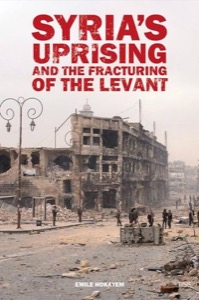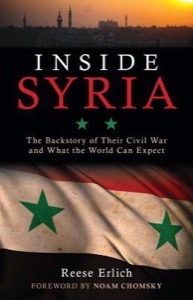The five year long Syrian Civil War is one of the largest conflicts in our world at this time. 250,000 dead (possibly more than 470,000 by some estimates), 6 million refugees, 11 million IDPs — the Syrian Civil war is a disaster and it doesn’t look to be ending soon.
The Middle East is not my specialty; Japan is the foreign country I know most about although I covered Tajikistan and Central in my Regional Analysis class at Royal Military College, and nearly wrote my master’s thesis on Iran. The closest I have ever been to the Middle East is Iran, with a layover in Dubai. But in working with the Okanagan Refugee Coalition for Advocacy (ORCA), I decided I needed to learn more about the context that these people are escaping from.
Coming to grips with the Syrian Civil War has a bit of a learning curve. Inside the country there are a lot of conflicting players. Then, as always, there are the outside influences. This (admittedly simplistic) WaPo diagram gives you a sense of the growing complexity (click to see the full flowchart):
The conflict in Syria not only involves lots of players, but also lots of issues: Syria is an example of the failure of the Arab Spring; it lies at the heart of the rise of ISIL/ISIS; it is a flashpoint of sectarianism and secularism; is a proxy in the conflict between Iran and Saudi Arabia, and between Russia and the West. And that doesn’t even include the legacy of post-colonialism and dictatorship that Syria has suffered.
There are layers upon layers, so as a beginner I was looking for some books to provide context. Here are a few recommendations:

Syria: A History of the Last Hundred Years by John McHugo
If you are looking for a sweeping history of the country itself, this is a good place to start. McHugo is not the best writer, and the organization of the book is basically a chronology so it can get a little boring to read, but it will walk you through the various stages of Syrian history from its creation via the Sykes-Picot Agreement; the fall into Baathism and takeover by Assad the Elder; and right up to the beginning of the current crisis with the refusal of Assad the Younger to step aside, sparking the disaster we find ourselves in today.

Syria’s Uprising and the Fracturing of the Levant by Emile Hokayem
If you can only read one book, and enjoy highly analytical think-tankese, this is the book you should read. Hokayem does a great job covering the various players and issues and it is very tightly written. Unfortunately, this book was published right before ISIS became a thing, so you won’t get much on that.
If you prefer a less dense read with a little more hand-holding, you might want to try the next book on the list.

Inside Syria: The Backstory of Their Civil War and What the World Can Expect by Reese Erlich
This book is kind of the opposite of Hokayem’s. Rather than Ivory Tower analysis, Erlich provides many personal interviews with people on the ground. He burned up a lot of shoe leather traveling to 10 countries, asking and answering such questions as: Who supports Assad? Why does Iran back Syria? What does Israel think? The Palestinians? The US and Russia?
Though it isn’t the most well written book (Erlich writes like your eccentric elderly uncle relates a story at the Thanksgiving dinner table, which admittedly does have a kind of charm, and is certainly accessible, but sometimes you need a sip of brandy to get through the numerous digressions). Luckily (?) Erlich is able to cover ISIS a bit, and since the first quarter of the book has a (meandering) early history of Syria, Inside Syria is the broadest book I have read so far, and a pretty good primer.
All of the books above are intent on describing the roots of the war and the conflicting interests of all the players involved. They don’t really dare to make any concrete policy proposals. The analyses are descriptive rather than prescriptive, which is entirely understandable looking at the publication dates: mostly written in the early stages of the war. If you want policy prescriptions, there are enough of those in the magazines and online.
Next on my list is Syria by Samer Abboud. You can always see what I am reading by looking at my Syria shelf on GoodReads.
Now for a digression on ISIS. You can’t go wrong reading Graeme Wood’s Atlantic piece on What ISIS really wants which is brilliant. If you want a little more, try:

The ISIS Apocalypse by William McCants
Short and dense. This is a great primer and covers a lot of the ground Graham did in his piece mentioned above, but with more details. If you can only read one book about ISIS, this is probably it.

Black Flags: The Rise of ISIS by Joby Warrick
This is a much longer account of the history and formation of ISIS. Really it is biography of Abu Musab al Zarqawi, the Jordanian terrorist that put the pieces in place for ISIL/ISIS to be formed. Syria only shows up the last third of the book, and only briefly. Warrick does an excellent job weaving the personal accounts of a number of well-placed individuals (the diplomat, the suicide bomber, the military intelligence agent, the king, etc.) into an enthralling narrative. A great read, but probably only for those really interested in the history of ISIS.
What is going on now
If you want to follow in real time there are many great resources online. Joshua Landis is a giant in English language commentary on Syria and his blog Syria Comment features other prolific writers like Aron Lund. Lund is also good to follow on Twitter @aronlund. @RamiJarrah is good too. He spends a lot of time behind the lines and puts a lot of his films on YouTube. He has been featured on CBC’s The Current a few times recently.
If you want a weekly update in your email I can recommend Syria Deeply. They also maintain the conflict map screencapped below.

Speaking of conflict maps, once a month Agathocle deSyracuse updates his amazing conflict map, as well as posts many others.
Finally, the damascusbureau.org women’s blog is particularly eye-opening. If you enjoy your coverage chaotic and crowdsourced, /r/SyrianCivilWar is very active and I have found some good resources in there.
If you have any recommended resources, whether they be books, mags or online, please share them in the comments.



